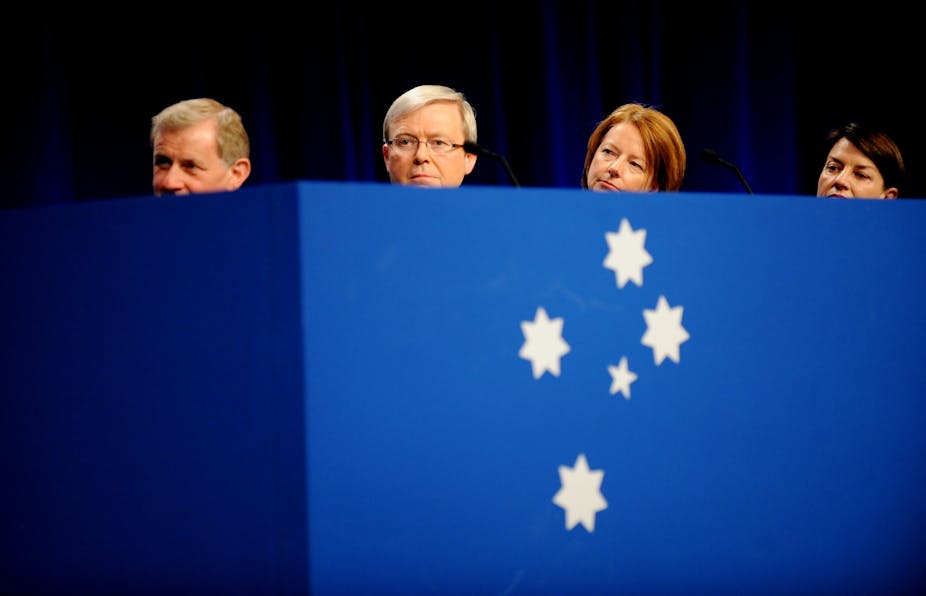Last night on the popular interactive current affairs program, Q&A, Kevin Rudd admitted that he isn’t perfect.
Rudd told viewers and studio audience members that he was “wrong” to shelve the Emissions Trading Scheme that he had advocated, shortly before his demise as Labor leader.
“You make mistakes in public life, this was a big one,” Rudd confessed.
The headlines this morning may well be focused on Rudd’s mistake and his consequent admission, but the debate on last night’s program also revealed something of the murkier side of parliamentary politics – that is, what goes on behind the closed doors of the cabinet and the party room.
What the public saw of the ETS debate last year centered on opposition to the government’s proposed scheme encountered in the Senate.
At the same time, however, Rudd revealed last night that “there were a diversity of views at that time in the cabinet.”
Although refusing to name any individuals, the former PM suggested that there were members of the cabinet who wanted to ‘kill’ the ETS ‘for good’.
Faced with a hostile Senate and dissent from within his own ranks, Rudd decided to dump the scheme.
His popularity took a massive hit, and the rest is – as they say – history. But is it?
Rudd’s confession will do little to help the image of the Labor Party and its current leader, Julia Gillard, at a time when the party is soul-searching in the wake of a massive defeat in NSW.
Accusations of bad advice, disloyalty and undermining have already started to flow from both sides of politics.
Some commentators have even suggested that Rudd sees himself as back in the running for the top job in the Party. This may not be the end of the Rudd-Gillard leadership saga.
Yet it also points to some of the ironies of party politics in Australia.
We expect political parties to be disciplined. When these sorts of conflicts emerge they weaken the image of a party in the eyes of the voting public.
Cabinet solidarity is essential to party government – collective decisions are necessary to push legislation through parliament and to ensure that governments (and political parties) can be held accountable for their actions at election time.
Nevertheless, there will always be disagreements over policy detail and direction.
The problem is that the discipline and cohesion that we expect from political parties means that these debates are not often heard in the open.
It is also a stark contrast from the norms of parliamentary democracy, where decisions are made through a process of public debate, open questioning and voting in the parliamentary chambers where individual parliamentarians’ positions are revealed.
The clash of titans that we see in political debate in Australia between the major political parties never really reveals the full story.
Parties are not homogenous – their membership is often as diverse as Australian society itself and this means that differing opinions need to be accommodated and reconciled.
The fact that this occurs behind closed doors reflects our expectation that electorally popular parties need to be strong, decisive and cohesive.
Yet it also highlights a fundamental tension with the expectations of parliamentary democracy that policy debate should occur in the public domain.
Rudd’s comments last night on Q&A brought this paradox to the fore.
After explaining his decision to dump the ETS, an audience member asked Rudd the pertinent question, why didn’t you articulate this to the public a year ago? His answer was “guess what? Political leaders are not perfect – they don’t communicate.”
But with the tensions inherent in party and parliamentary government, and media and public expectations, did he have any choice?

